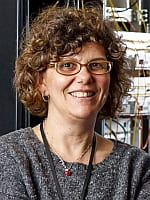
Owning our Digital Destinies – an introduction to the Bristol Digital Futures Institute
“Researchers, businesses, government and diverse communities must come together to proactively shape our digital future”, say Professors Susan Halford and Dimitra Simeonidou, Co-Directors of Bristol Digital Futures Institute (BDFI), the University of Bristol’s newest institute.
For the past decade Susan’s work has focused on the interface between social and computational sciences, while Dimitra specialises in high-performance networks and future internet research.
The BDFI is led by Professor Susan Halford (School of Sociology, Politics and International Studies) and Professor Dimitra Simeonidou (Department of Electrical and Electronic Engineering). For the past decade Professor Halford’s work has focused on the interface between social and computational sciences, while Professor Simeonidou specialises in high-performance networks and future internet research. The fusion of expertise across disciplines is core to BDFI, which aims to transform the way we create, utilise and evaluate new digital technologies to benefit our society now and in the future.

“The digital revolution has transformed every facet of our lives in ways that few of us could have imagined, from our choice of partner through to our future career prospects”, says Dimitra. “Even the engineers who developed the underpinning technologies cannot have foreseen the full extent of it.”
Susan adds “Once a technology is released into the world, it tends to evolve in complex and contingent ways – in response to market forces, government regulation and the communities and end users themselves. There are beneficial outcomes, of course, but also challenges, and not everyone benefits equally.”
These challenges have been brought into sharp focus by the COVID-19 pandemic. We have managed to keep our society and economy going as best as possible by relying on digital technologies. We’ve tried to understand the spread of the virus through data collection and epidemiological computer modelling; we’ve worked remotely where possible; bought essentials online; and even taken part in virtual gym classes. But many have also struggled.
“We used to refer to the digital divide, but some in the field have started talking about a digital chasm opening up now”, says Susan, whose work focuses on the sociotechnical aspects of digital innovation.
“We hear of people trying to do home schooling with a mobile phone and no keyboard, really basic fundamental things. And it’s not just to do with access to devices or networks, though that’s clearly important; it’s about digital skills, education and opportunities. Who is able to work from home and who is going out to work at risk of exposure to the virus? So, in many ways, it’s an opportune time to start talking about some of these issues with respect to digital futures.”
Proactively shaping futures
The next wave of the digital revolution, which will include the extension of technologies including artificial intelligence, augmented reality, virtual worlds and superfast connectivity, presents perhaps even greater challenges and opportunities. But rather than sitting back and letting the invisible hand of markets and other forces dictate how the technologies evolve and for whom, can we be more pre-emptive and proactively shape the future?
Susan and Dimitra believe we can. Their respective backgrounds, in sociology and engineering, reflect the wider interdisciplinary makeup of the BDFI. This includes academic colleagues across all six faculties of the University and a wider community of partners – from world-leading technology businesses and creative companies to local government and community organisations.

“Typically, when we are looking at digital innovation from a technological point of view, it’s a very methodological process; everything has an input and everything has an output as part of a technical system,” says Dimitra. “What we do within BDFI is to include social, ethical, environmental and privacy considerations as an integral part of the digital technical design so we can innovate responsibly.”
Collaborative engagement
The BDFI has been made possible through £116 million in funding from a variety of sources, including Research England, philanthropic contributions and the BDFI’s partner organisations. The diverse group of 27 partners includes BT, Dyson, BBC, Airbus, Black South West Network, Ashley Community Housing and the West of England Combined Authority. The full-scale BDFI facility will be based at the University’s planned Temple Quarter Enterprise Campus, which is set to deliver more than £600m of employment and financial benefit to the Bristol region’s economy over the next ten years. The innovative spaces there will include a neutral lab co-creation environment for University and BDFI partners; a Reality Emulator (an advanced digital twin facility) to test new technologies in alternative futures; and a highly interactive instrumented auditorium for groups of people to make collective decisions.
“Our approach is participatory and experience-based,” says Professor Simeonidou. “Our digital design methodology will be informed in the very early stages by how technology is being used in context. This will be key in driving technology creation fit for future society. The way technology is consumed, for example, by academics is going to be very different to how it is being consumed by a youth group in their own environment, and it is important to understand such differences. We’re involving the end user from the very beginning in our innovation process.”
As soon as COVID-19 allows, BDFI will bring people together into the shared co-creation spaces and labs, including academics, students, industry and local communities, to start the conversation and to start ideating among themselves.
In addition, BDFI will reach out, through high-speed fibre connectivity, with its collaborative, distributed community across the city, effectively creating its own ‘internet for social-technical innovation’. Ultimately, the hope is to take the BDFI approach across the UK and eventually globally.
A lot of people are talking about futures at the moment, but for the most part in a rhetorical way; whereas we’re really, really serious in thinking about how to engage much more directly, constructively and proactively with the futures we’re creating here in the present,’ says Professor Halford. ‘The way that we’re engaging different ecosystems and different forms of knowledge in the project of creating futures, with the kinds of technical facilities that we are building, I think that’s really quite unique. I’m not sure anybody is doing anything quite like that.’
If you would like to start a conversation with BDFI, please email bdfi-enquiries@bristol.ac.uk

